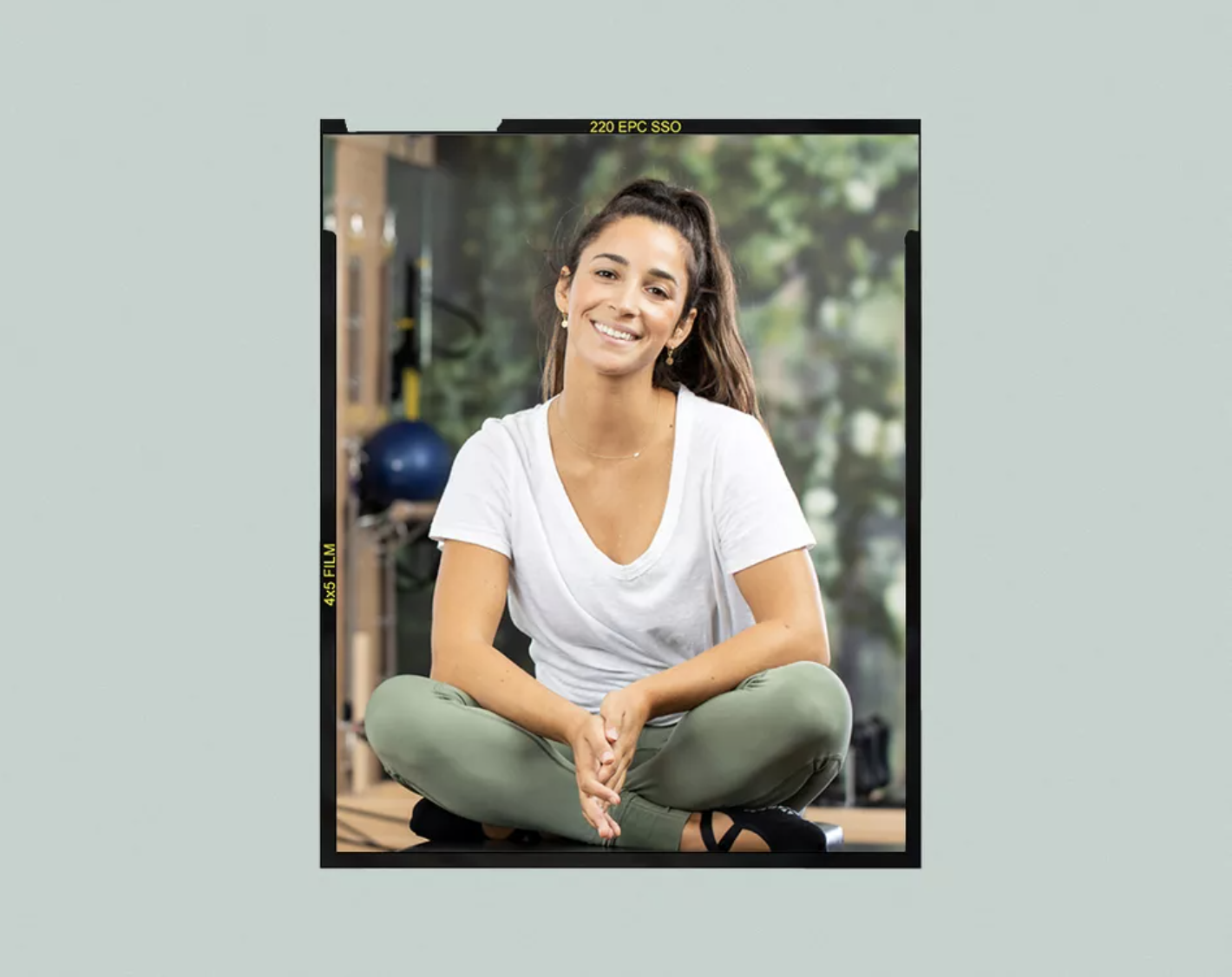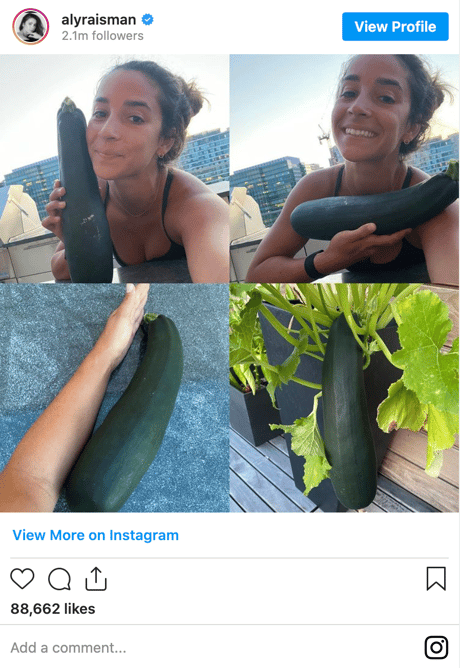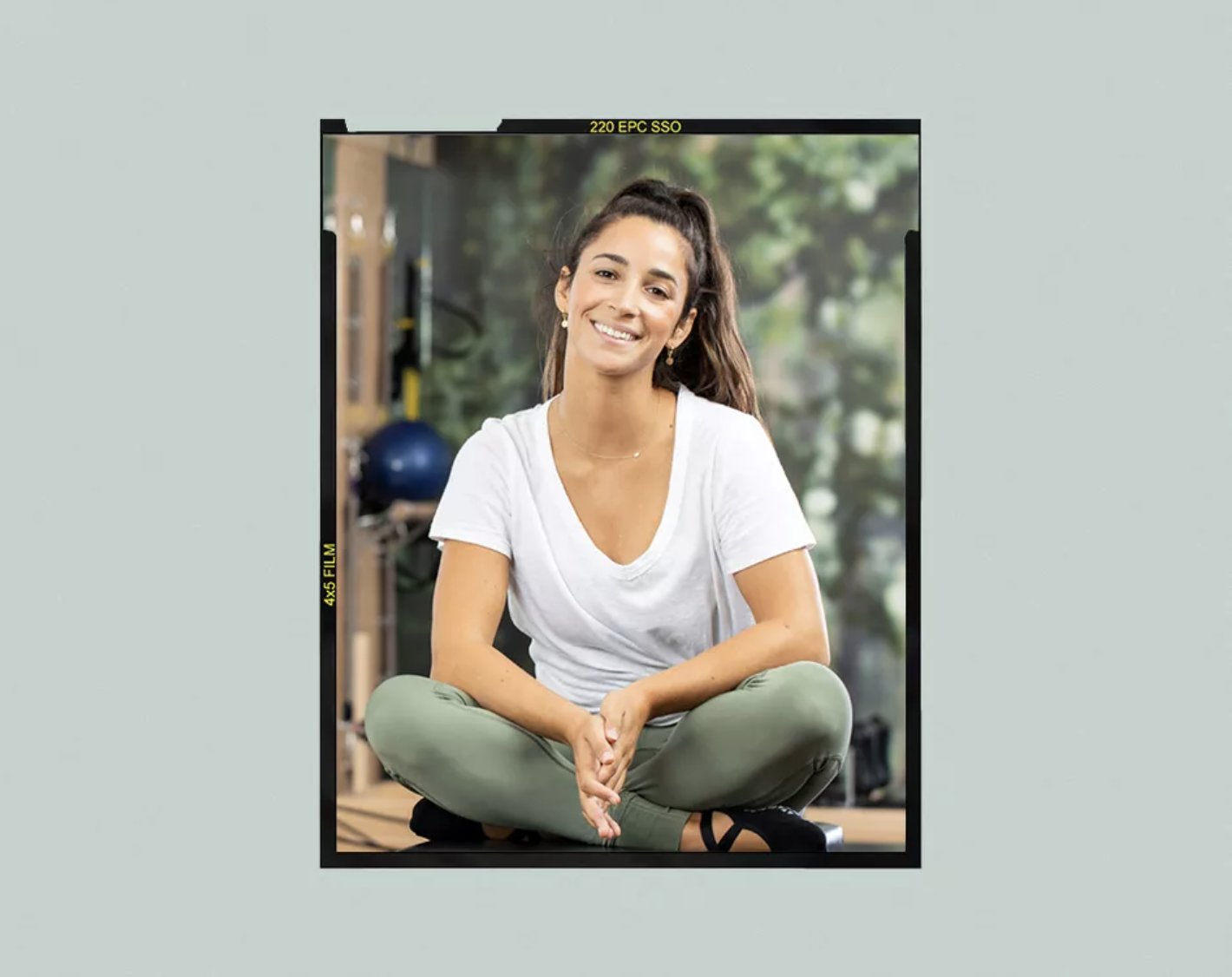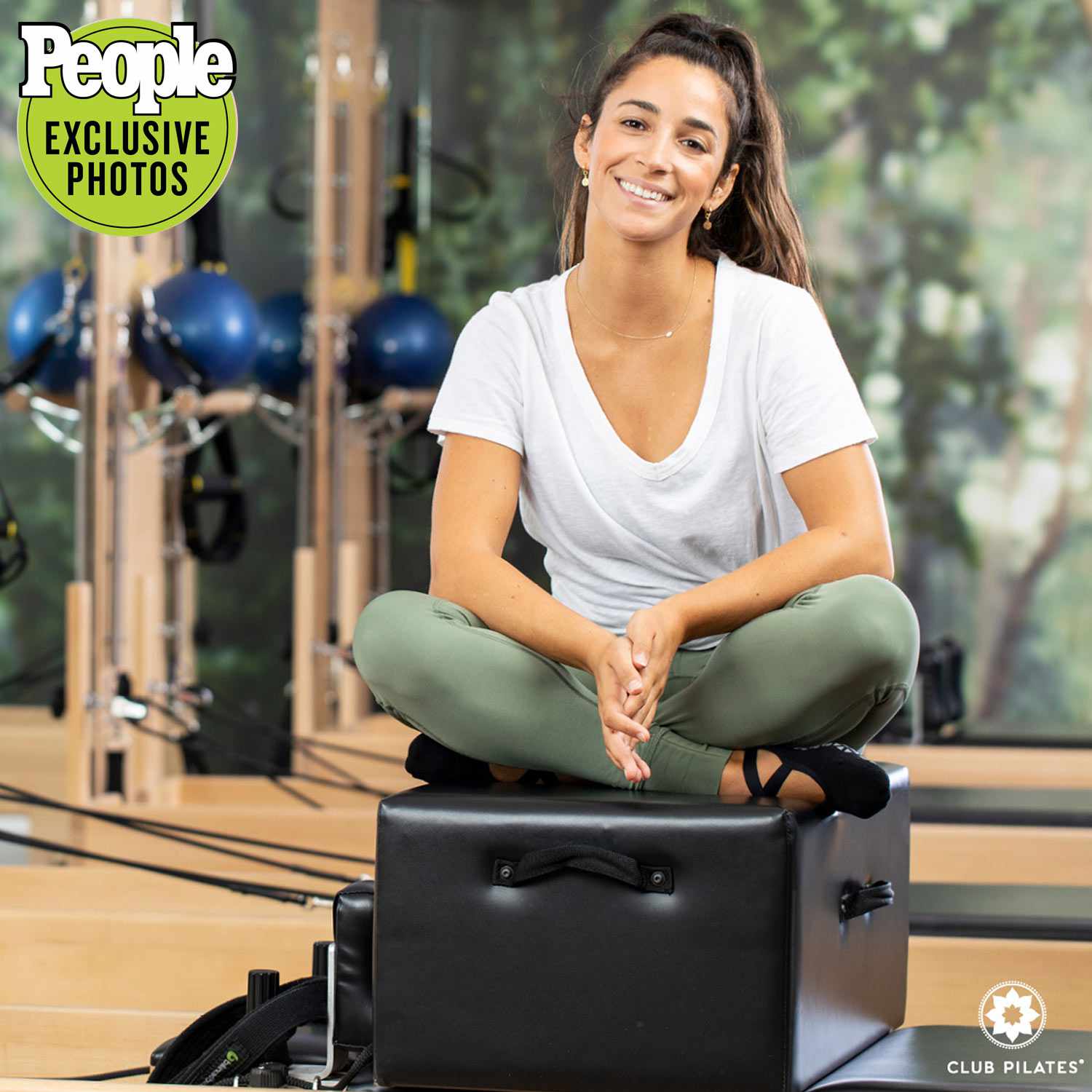The former Olympic gymnast shares her shockingly approachable workout routine.
Read Aly's entire interview on Byrdie.
Throughout the pandemic, I’ve wondered: What does healthy look and feel like?
I’ve experienced back pain from sitting at my desk too long, an achy neck from watching too much TV in bed, and I certainly haven’t always eaten right. Yet now doesn’t seem like the time to start obsessing about my workout routine, or cut out my indulgences, either. Balancing what’s good for my body and mind in during these stressful times seemed like an impossible problem.
Speaking with former Olympic gymnast Aly Raisman provided some answers. As the first American woman to win an Olympic gold for her floor routine in 2012, she became an icon of physical fitness.
Now, after retiring from gymnastics, she's been open about struggling with burnout, mental health challenges, and her disappointment that USA Gymnastics did not prevent—or take responsibility for— their doctor's abuse of hundreds of young gymnasts. She's had to decide what healthy looks like in her life post-competition, and she's become a role model for mental wellness in the process.
The mind and the body are, of course, connected, and Raisman has found Pilates allows her to find “peace between the ears.”
She’s now the brand ambassador for Club Pilates, which she loves because it allows her to go at her own pace, depending on what she feels that day.

B: Tell me about your current workout routine.
A: Pilates has been really helpful for me. I’ve struggled a lot in the last couple years with having energy—I just haven’t really been feeling well. My body responds really well to Pilates. I don’t do the same workout every single day, because I’m still recovering. And every day, I feel differently. I take it one day at a time, because I’m really working on listening to my body right now.
I started doing Pilates years ago, when I was younger, because my mom did it. When I was training in gymnastics, my conditioning incorporated Pilates. One of my coaches used to do it too, so sometimes I would join her. In gymnastics, every part of your body has to be strong, because you’re flipping through the air. Pilates was really impactful in my career, because you can focus on certain muscles you want to strengthen. For example, like a certain part of your ankle, or a certain part of your quad that needs to be strong, or even your hamstrings.
It’s really helpful when you’re landing certain things, or toe points, or different flexibility stuff. In gymnastics, you have to have body awareness and isolate different muscles.
What I really like as well is that you can really go at your own pace. If the instructor says to do ten reps of something, if you just want to do one, that’s okay, too. It’s about doing what feels right for you. There’s about twelve people in a class, so it feels very personalized, like you’re still getting a one-on-one session.
B: This makes me want to try Pilates, but I haven’t been able to because of the pandemic.
A: The reformer [editor's note: a large piece of Pilates equipment] obviously isn’t at home, but you can kind of do it anywhere, which is cool. Before COVID, when I was traveling, I would do it on the airplane, in my seat. You can experiment and do it in different places.
If you go into classes, they have the big reformers, but in general, you don’t need any special equipment. You could use a chair at your house or just use your body. If I’m driving somewhere on a long road trip, and I have to pull over to use the restroom or get food, I like to just get out of my car and do some leg exercises, just to move my body.
I try to get in the habit of doing a little bit sporadically, when I can. Little toning and tightening exercises can feel good, to get yourself moving after you’ve been sitting for a long time.
B: How do you stay motivated to work out when you’re not training for something specific?
There are plenty of days where I don’t want to work out. It’s totally normal. But I’ve changed my mentality on it in the last few years. For me, it’s about finding things that make me feel good. For example, one of my runs wakes up at 4:30 in the morning and runs for an hour almost every single day. I don’t want to do that. It makes me feel so sick. It’s not enjoyable for me, but she loves it.
Now, I’ve found Pilates makes me feel really good. My motivation is just knowing that I’m going to feel stronger and more [present] in my body. I don’t want to leave a workout completely drained and exhausted—that’s how I used to leave my workouts. Now I really just do it for peace between the ears and my mental health. That’s really been the priority for me.
I take it day by day and do the best I can do. Sometimes it’s going for a long walk outside then doing five minutes of Pilates. Some days, I’m feeling thirty minutes of Pilates. I’ve learned that it’s okay to have days where I don’t feel well. A lot of people say that when they’re not feeling well, when they work out, they feel better. I personally don’t feel that way. So I really have to listen to my body.
A lot of people say that when they’re not feeling well, when they work out, they feel better. I personally don’t feel that way. So I really have to listen to my body.
B: You have a lot of experience with hard training. How do you listen to your body actively? How do you know when to stop?
A: It’s important to remember that everyone is different—everyone’s comfort level, everyone’s overtraining looks differently. I think it’s really important to look inward. I know we live in a world where it’s so easy to compare ourselves to other people. Especially with social media, and with the obsession our culture has about winning, but I try to focus on myself and be the best I can be. Everyone’s body is unique. Someone’s great workout may look different to someone else.
I start by trying to be aware of how I feel when I wake up. Sometimes I know that I’m not feeling as great—maybe I do a bit more stretching, and a little bit less in the workout. But I feel like I can start to be more aware of how I’m feeling and able to prevent myself from being too exhausted or feeling sick. If I work out too much, I feel nauseous or get a headache or my muscles start cramping, and this was not the case when I was younger. I definitely can’t work out the way I used to. But I think I pushed myself for so long, to the point where my body is done, and I’m fine with that, because I still feel like I’m getting good workouts.
As long as I’m healthy, as long as I wake up every day and feel that I’m looking forward to the day and able to appreciate the little things—that’s really my priority. I don’t need to do intense workouts like I used to, to please other people. I’m just doing it for myself now, to feel good.
B: Tell me about your body scan meditations—you do them every day, and you’ve even started to lead them for your followers on social media.
A: I really like the body scan, because it helps me be more aware of how I’m feeling. It’s made me realize how much tension and tightness I hold in my body, and this helped me realize that when I’m stressed, I feel a lot more pain and tension. So I’ve been able to recognize when I’m starting to get more stressed and just pay more attention to relaxing my body.
I try to lay down and go through each body part, and try to make myself more comfortable, relaxed. But it can even be something like, when I’m driving in the car, are my hands gripping the steering wheel too tight? Or are my shoulders too raised? Is my jaw clenched? Just being more aware of where I’m holding unnecessary tension throughout my body.
B: I know a lot of people who have struggled with eating disorders and other issues who don’t necessarily want to feel connected to their body. They’re afraid of something like a body scan meditation, because they’re worried they won’t like what they’ll find. Do you have any advice for someone who might be intimidated by a practice like this?
A: I think it’s great that this is becoming more of a conversation, because I think it’s so normal, and I think so many people have experienced that, myself included. I personally just try to remind myself that whatever I’m stressed about, sometimes it’s something that happened a long time ago, and sometimes it’s creating a scenario that may not happen in the future. So I try to remind myself that in this moment, in the surroundings around me, where I am, everything’s fine right now. I try to remind myself to be present, though that doesn’t always work.
I’ll also write in a journal. Sometimes I write to help myself, sometimes it’s about calling someone I know and trust and having them guide me through whatever I’m going through. But I really have found the way that I talk to myself is really important. I try to talk to myself the way I talk to a loved one or a friend.
B: I know you love to garden. What do you like about it? What are your favorite plants?
A: Gardening makes me feel really calm; it helps me stay present. I feel very grateful that I found gardening because it’s been really therapeutic and healing for me. I really love growing—there’s not a whole lot of things that I don’t like growing. Even if there’s a certain food I don’t like eating, I still grow it, just because I love the process of watching a seed grow into a flower or a vegetable.

I love growing cucumbers. I’m not a big fan of jalapeno peppers, but I do love growing them because they grow so fast. A lot of people enjoy them, so I love giving them to friends and family.
B: What are you planting this year?
A: I am trying to grow a bunch of different things. My mom and I really love doing it, so we do it together. Last summer, I tried to grow watermelon and cantaloupe, but I started too late in the season, so I’m very much looking forward to trying that.
Then I’m trying to grow as many vegetables as I can—a lot of lettuce. My goal would be around the spring, summer, fall, that I don’t have to buy any vegetables from the grocery story. I’m going to try and we’ll see. The climate here is a little tricky.
B: I noticed on your Instagram that you and your mom are a big fan of the AeroGarden.
A: I’m actually using the AeroGarden to start some seeds right now, so by the time the climate gets warmer here, my plants will have already germinated, and some of them hopefully will be flowering, and so that will be quicker, I’ll get the fruit or vegetable quicker. I like that you get a head start. I started planning seeds at the end of February. So by April or May, when I start to put stuff outside, it will be way ahead of the game.
:max_bytes(150000):strip_icc():format(webp)/harvest-f7bcc261708442d0bbc60fb4b1dff137.jpeg)
I also like to grow different herbs and lettuce in there too, because it’s so easy. They grow so fast. If you pick it within a few days, for me it grows back. I even have one in my bathroom that just has flowers in it. So it’s really beautiful too. It brings me a lot of joy, makes me really happy. I even pick some of the flowers and do a flower bouquet. It’s all the little moments that help me stay present and stay appreciative for the little things I can take for granted.



